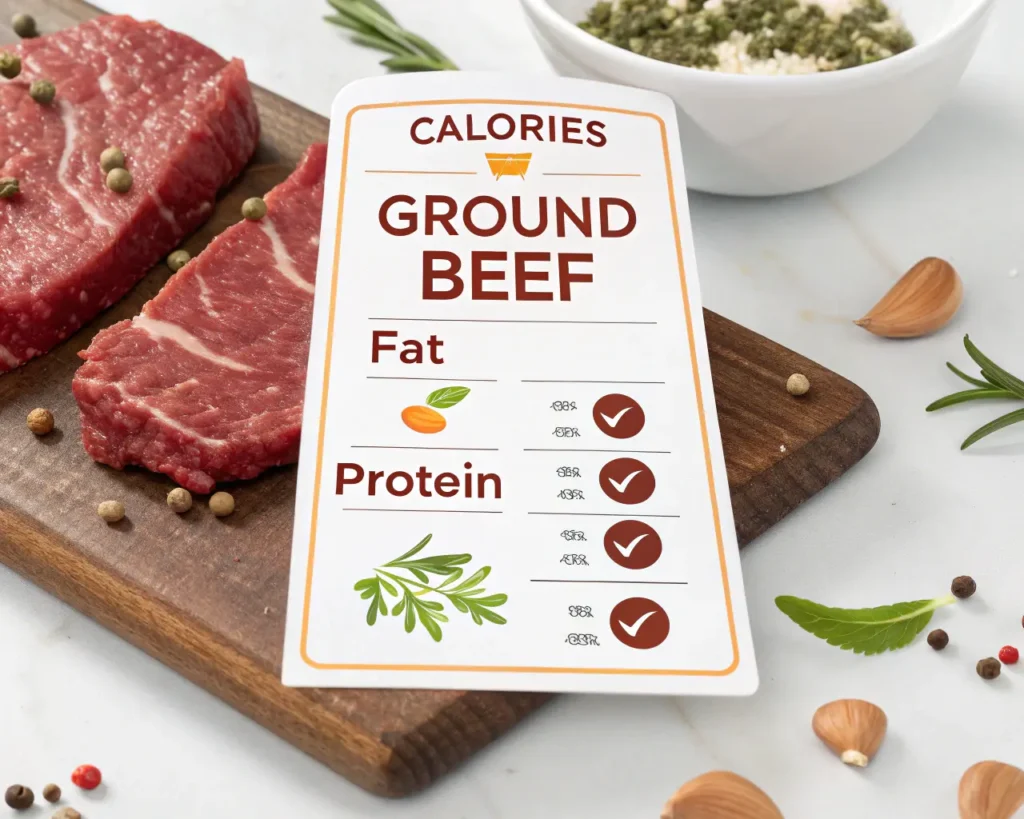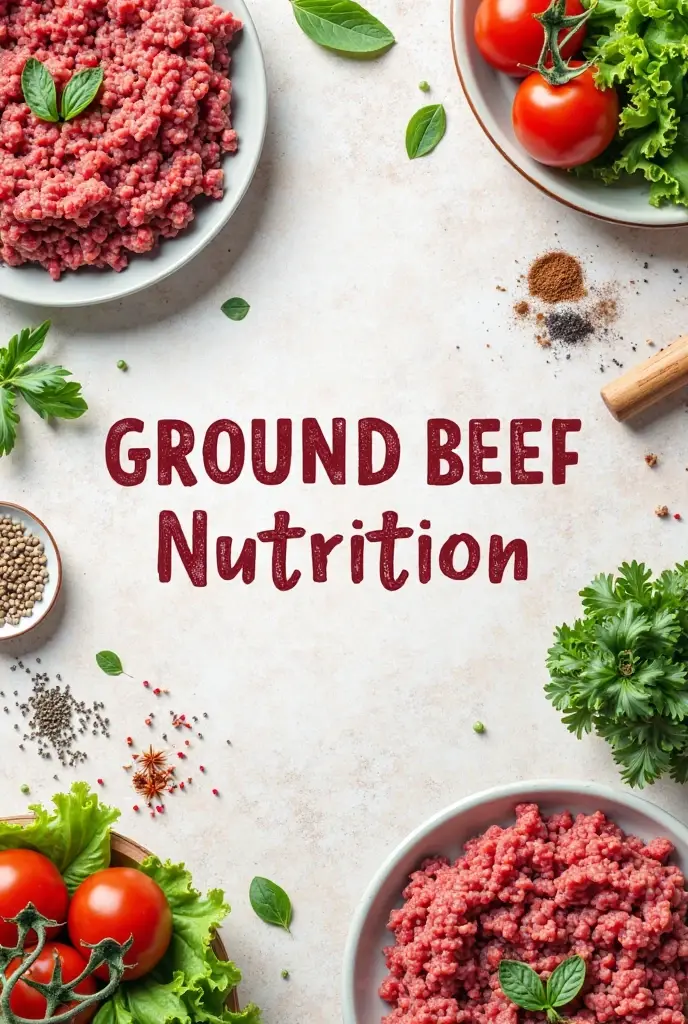Ground Beef Nutrition: Essential Facts You Should Know for Healthier Meal Planning
Picture yourself standing in the grocery store meat aisle, examining packages of ground beef while questioning whether you’re making the optimal choice for your family’s wellbeing. Conflicting information surrounds this popular protein – some sources praise its nutritional density, while others raise concerns about fat content. As someone who prioritizes nourishing your loved ones while managing your budget effectively, you deserve accurate information about ground beef nutrition. This comprehensive analysis will equip you with essential knowledge to make educated decisions about incorporating this versatile protein into your healthy eating strategy.
Table of Contents

Complete Guide to Ground Beef Nutrition Facts and Health Benefits
Understanding Ground Beef Nutrition Basics
Ground beef represents one of America’s most consumed protein sources, yet many consumers remain unclear about its nutritional profile. The USDA classifies ground beef according to fat-to-lean ratios, creating distinct categories that significantly impact nutritional content.
Different fat percentages offer varying nutritional profiles:
- 70/30 blend contains 70% lean meat, 30% fat
- 80/20 mixture provides moderate fat content
- 85/15 option delivers balanced nutrition
- 90/10 variety offers lean protein
- 93/7 selection maximizes protein density
- 95/5 provides ultra-lean options
Your choice directly influences caloric intake, protein concentration, and micronutrient availability. Grass-fed varieties typically contain higher omega-3 fatty acids and vitamin E compared to grain-fed alternatives, though both provide substantial nutritional benefits.
Ground Beef Nutrition Facts Breakdown by Fat Content
Nutritional Comparison Analysis
| Fat Content | Calories | Protein (g) | Total Fat (g) | Saturated Fat (g) | Iron (mg) | Zinc (mg) | B12 (mcg) |
|---|---|---|---|---|---|---|---|
| 70% lean | 332 | 14.0 | 30.0 | 11.9 | 1.6 | 4.1 | 2.6 |
| 80% lean | 254 | 17.2 | 20.0 | 7.7 | 1.8 | 4.4 | 2.6 |
| 85% lean | 215 | 18.9 | 15.0 | 5.8 | 1.9 | 4.5 | 2.6 |
| 90% lean | 176 | 20.0 | 10.0 | 3.9 | 2.0 | 4.7 | 2.6 |
| 95% lean | 137 | 22.0 | 5.0 | 2.3 | 2.1 | 4.9 | 2.6 |
Nutritional values per 3.5 oz (100g) serving
Macronutrient Profile Excellence
Ground beef nutrition shines through its exceptional protein quality. This complete protein source contains all nine essential amino acids your body cannot manufacture independently. The biological value rivals eggs and dairy products, making it exceptionally effective for muscle protein synthesis.
The protein digestibility corrected amino acid score (PDCAAS) for beef reaches nearly perfect ratings, indicating superior utilization by your digestive system. Leucine content particularly supports muscle recovery and growth, especially beneficial for active individuals and aging adults concerned about muscle preservation.
Fat composition varies significantly across different blends. Leaner options concentrate nutrition while reducing saturated fat intake, though some fat enhances flavor and provides fat-soluble vitamin absorption. Your cooking methods also influence final fat content – grilling and broiling allow excess fat drainage.
Essential Vitamins and Minerals in Ground Beef Nutrition
Micronutrient Powerhouse Benefits
Ground beef nutrition delivers exceptional concentrations of vital micronutrients often lacking in modern diets:
Iron (Heme Iron) Your body absorbs heme iron from ground beef two to three times more efficiently than plant-based iron sources. This superior bioavailability makes ground beef particularly valuable for preventing iron-deficiency anemia, especially important for menstruating women, children, and vegetarians transitioning to omnivorous diets.
Vitamin B12 (Cobalamin) Each serving provides substantial B12 concentrations essential for nervous system function and DNA synthesis. Since B12 occurs almost exclusively in animal products, ground beef nutrition becomes crucial for individuals avoiding plant-based diets or those with absorption difficulties.
Zinc This mineral supports immune system function, wound healing, and growth development. Ground beef provides highly bioavailable zinc that your body readily utilizes, unlike plant sources that contain compounds inhibiting zinc absorption.
Selenium Acting as a powerful antioxidant, selenium protects cellular structures from oxidative damage while supporting thyroid function. Ground beef nutrition consistently delivers selenium across all fat percentages.
Additional Beneficial Compounds
Beyond standard vitamins and minerals, ground beef contains unique compounds supporting optimal health:
- Creatine enhances muscle function and explosive power
- Carnosine provides antioxidant protection
- CoQ10 supports cellular energy production
- Conjugated linoleic acid (CLA) may support body composition goals

Ground Beef Nutrition and Health Benefits
Muscle Building and Athletic Performance
Your muscle-building efforts benefit tremendously from ground beef nutrition. High-quality protein provides building blocks for muscle protein synthesis, while leucine triggers anabolic pathways promoting muscle growth and repair.
Iron facilitates oxygen transport during exercise, preventing premature fatigue and supporting endurance performance. Natural creatine content enhances explosive power output, particularly beneficial for strength training and high-intensity activities.
Brain Health and Cognitive Function
Ground beef nutrition supports cognitive performance through multiple mechanisms. B12 deficiency correlates with cognitive decline and memory problems, making adequate intake crucial for brain health maintenance.
Iron deficiency impacts concentration, learning ability, and overall cognitive performance. Children and adolescents particularly benefit from iron-rich foods like ground beef during critical development periods.
Grass-fed varieties contain higher omega-3 concentrations, supporting brain structure and function. Choline content aids neurotransmitter production and brain development in growing children.
Immune System Support
Your immune system requires adequate protein for antibody production and immune cell function. Ground beef nutrition provides high-quality protein along with zinc and selenium – minerals directly supporting immune response effectiveness.
Iron supports immune cell proliferation and function, while B vitamins facilitate energy production within immune cells. This combination creates comprehensive immune system support through optimal nutrition.
Potential Health Concerns and Ground Beef Nutrition
Saturated Fat and Heart Health
Current research reveals more nuanced perspectives on saturated fat than previous decades suggested. While excessive intake may contribute to cardiovascular risk in susceptible individuals, moderate consumption within balanced diets appears acceptable for most people.
Your individual risk factors – including genetics, overall diet quality, exercise habits, and existing health conditions – influence how saturated fat affects your health. Choosing leaner ground beef options reduces saturated fat while maintaining nutritional benefits.
Processing and Safety Considerations
Food safety requires proper handling and cooking practices. Ground beef must reach 160°F internal temperature to eliminate harmful bacteria. Fresh products offer optimal nutrition, though properly frozen ground beef retains most nutritional value.
Organic and grass-fed options eliminate antibiotic and hormone exposure while potentially providing enhanced nutritional profiles. However, conventional ground beef still delivers substantial nutritional benefits when budget constraints exist.
How to Maximize Ground Beef Nutrition in Your Diet
Smart Shopping Strategies
Optimize your ground beef nutrition by following these selection guidelines:
- Choose appropriate fat content matching your health objectives
- Select grass-fed options when budget permits
- Avoid products containing unnecessary fillers or preservatives
- Consider organic certifications for reduced chemical exposure
- Purchase from reputable sources ensuring quality and safety
Healthy Cooking Methods to Preserve Nutrition
Your cooking approach significantly impacts final nutritional content. Grilling and broiling allow fat drainage, reducing calories while concentrating protein and minerals. Pan-frying retains more fat but provides enhanced flavor and satiety.
Avoid overcooking, which can reduce B vitamin content. Proper seasoning with herbs and spices may enhance nutrient absorption while adding antioxidant compounds. Pairing ground beef with vitamin C-rich vegetables boosts iron absorption efficiency.
Ground Beef Nutrition vs Other Protein Sources
Comparative Nutritional Analysis
| Protein Source | Calories | Protein (g) | Iron (mg) | B12 (mcg) | Zinc (mg) | Cost per serving |
|---|---|---|---|---|---|---|
| Ground Beef (85% lean) | 215 | 18.9 | 1.9 | 2.6 | 4.5 | $3.50 |
| Chicken Breast | 165 | 31.0 | 0.7 | 0.3 | 0.9 | $4.00 |
| Salmon | 208 | 20.4 | 0.3 | 3.2 | 0.6 | $8.00 |
| Lentils | 116 | 9.0 | 3.3 | 0.0 | 1.3 | $0.75 |
Values per 100g serving
Ground beef nutrition excel in several key areas:
- Budget-friendly complete protein source
- Superior iron bioavailability compared to plant proteins
- Exceptional versatility for meal preparation
- High satiety promoting appetite control
Special Dietary Considerations for Ground Beef Nutrition
Life Stage Nutritional Needs
Children and Adolescents Growing bodies require substantial protein, iron, and B vitamins for proper development. Ground beef nutrition supports growth spurts, brain development, and energy needs during active periods. Portion sizes should reflect age and activity levels.
Pregnant and Nursing Women Pregnancy increases protein, iron, and B12 requirements significantly. Ground beef nutrition addresses these elevated needs while supporting fetal development. However, proper cooking temperatures become crucial for food safety during pregnancy.
Older Adults Aging adults often struggle with protein intake and muscle preservation. Ground beef provides easily digestible, high-quality protein supporting muscle maintenance and overall health. Softer cooking methods may improve digestibility for those with dental challenges.

Conclusion
Ground beef nutrition offers exceptional value for health-conscious individuals seeking complete protein sources rich in bioavailable nutrients. While fat content requires consideration based on your individual health goals, the protein quality, iron concentration, and vitamin B12 content make ground beef a nutritional powerhouse worthy of inclusion in balanced diets.
Your success in maximizing ground beef nutrition depends on informed selection, proper preparation, and integration within diverse, plant-forward meal plans. By understanding these essential facts, you can confidently incorporate this versatile protein while supporting your family’s nutritional needs and health objectives.
Remember that individual nutritional requirements vary based on age, activity level, health status, and personal goals. Consulting healthcare providers ensures personalized guidance aligned with your specific circumstances.
Take Action for Better Nutrition Today
Ready to transform your meal planning with evidence-based nutrition knowledge? Start by evaluating your current protein sources and identifying opportunities to incorporate high-quality options like properly selected ground beef. Consider your family’s specific nutritional needs, budget constraints, and taste preferences as you develop sustainable eating patterns that support long-term health and satisfaction.
Share this comprehensive guide with family members and friends who could benefit from accurate ground beef nutrition information. Your commitment to informed food choices creates positive ripple effects throughout your community, promoting better health outcomes for everyone you care about.







